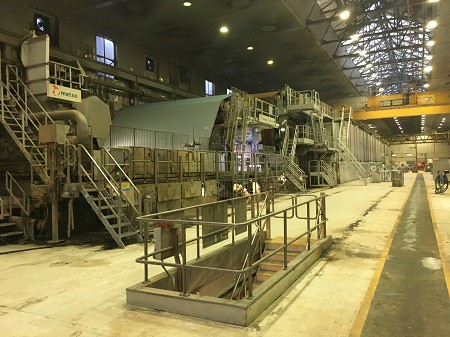UK-based paper and packaging company DS Smith has claimed that it has “found a solution” to coffee cup recycling, and has called for greater harmony across the sector to increase segregation.
DS Smith say it has been able to amend its pulping process at its 900,000 tonne capacity paper mill in Kent in order for it to process coffee cups and it could take in as much as 30,000 tonnes a year initially.

The DS Smith number six paper machine at its Kemsley mill which is a major producer of cardboard material
The process would see the cups separated at the company’s Kemsley mill in Kent with the paper going into the system and used for the production of cardboard. The plastic liner recovered from the pulping process would be burnt at the firm’s energy from waste plant.
On the basis that an average coffee cup weight is 8 grams without the plastic lid, according to environment charity Keepcup, 30,000 tonnes a year would equate to all coffee cups not recycled in the UK.
Statistics quoted by the Environment Audit Committee suggest that the British public dispose of 2.5bn single-use cups each year, while only in in every 400 is recycled and just 1% of consumers bring in their own re-usable cup.
Financial
The financial arrangements for the coffee cup recycling and whether DS Smith would pay for the cups or charge a gate fee has not been disclosed.
But, the company says it has written to the government to call for measures to support cup collection and provided details of its coffee cup recycling capacity to the PCRRG (Paper Cup Recycling and Recovery Group) of which it is a member.
The letter outlined proposals it would like to see introduced, which included calling for increased segregated paper collection as well as better infrastructure for coffee cup disposal.
The company is focusing on uncontaminated coffee cups and says that if all the lids and stirrers should be separated out.
“The plastic lining that must be removed from the cups, then we need to ensure that the cups have not been too badly soiled by food waste.”
Peter Clayson
DS Smith
Peter Clayson, general manager for DS Smith Recycling, explained the need for greater harmony across the board in tackling the traditional troubles with coffee cups.
Food waste
Mr Clayson said: “There are two challenges to recycling a high volume of coffee cups. Firstly, there is the plastic lining that must be removed from the cups, then we need to ensure that the cups have not been too badly soiled by food waste. If we can work together with local councils, coffee sellers, and the waste management sector to improve segregation of the cups and develop a comprehensive collection infrastructure, we can make a huge difference together.”
DS Smith is not alone in efforts to increase coffee cup recycling efforts. Veolia has previously worked with both Starbucks and Costa Coffee to help to increase the percentage of cups collected, as have charities Hubbub and ACE UK. Each of these have had limited success in upping the rate of recycling.
The facility is the first mill in the south of England to have such a scheme.
The post DS Smith prepared to take coffee cups at Kemsley appeared first on letsrecycle.com.
Source: letsrecycle.com Packaging



